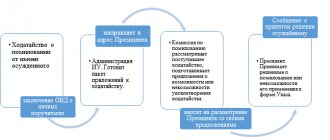Cassation appeal: what is it and what is its purpose?
The cassation procedure requires the filing of a complaint. She must appeal the court ruling, which has entered into force. Provided that this is not a Supreme Court ruling. The main task of the direction under consideration is that this court decision be challenged on the basis of mistakes made.
For example, if these errors were made during the proceedings, and ultimately had a negative impact on the decision made. And if, without correcting the errors in question, it is impossible to achieve a fair resolution of the dispute, protect the interests of the person and eliminate other problems.
Consideration of cassation: when it is necessary to cancel an appeal ruling or court decision
A cassation complaint has much in common with an appeal, which is why they are often confused. But the main difference between a cassation appeal is that it works only with the basis that was available before the decision was made. Will not take into account the circumstances that opened after this. So you will have to take into account the testimony and evidence that already exists when non-compliance with procedural norms is discovered. In this case, the decision is canceled or they undertake to revise it. Cassation will be considered if the case under consideration violated the following norms:
- Did not accept or incorrectly used the norms of the law in the field of protection of material rights;
- The legal provisions regarding the case in question were incorrectly interpreted;
- There is no record of the court hearing in the case under consideration;
- The court hearing the case was not composed correctly or one of the participants, who must be present there without fail, was absent from the meeting;
- The court conference was held without secrecy;
- The participant who was absent from the meeting was not notified of the place and date of the meeting (that is why he could not come).
It must be taken into account that the cassation procedure for considering a complaint is a rather lengthy and difficult process. The reason is also that courts rarely refuse decisions made by lower authorities. That is why, in order to achieve justice, it is often necessary to use the qualified help of a specialist. Especially if you need to make a complaint, indicate which points were violated, etc.
Remember, a refusal in the cassation court does not mean that it is impossible to achieve what you want. You can always file documents in the Supreme Court. It is impossible to challenge his decisions.
What will be the new appeal and cassation in criminal proceedings?
For almost a year now, the entire Russian legal community has been living in anticipation of the upcoming significant changes in the judicial system proposed by the Supreme Court of the Russian Federation. The innovations that will be adopted by the bill coming into force this fall will affect all procedural codes, since they involve the creation of a new judicial unit - separate courts of appeal and cassation. However, among representatives of the legal profession, the greatest interest was expectedly aroused by the institution of full cassation in criminal proceedings, new to the Russian legal system, and the procedure for appealing.
Let's try to answer questions about what will change in the appellate and cassation appeals in criminal proceedings.
1. How will the new procedure for filing appeals and cassation complaints be regulated?
From September 1, 2021, two updated chapters of the Code of Criminal Procedure of the Russian Federation – 45.1 and 47.1 – will be devoted to appealing decisions made by courts in criminal proceedings. In addition, additional regulation in order to minimize possible errors of law enforcement officials at the transitional stage will be provided by the Resolution of the Plenum of the Supreme Court of the Russian Federation “On the application of the norms of Chapter 47.1 of the Criminal Procedure Code of the Russian Federation governing proceedings in the cassation court,” approved on June 25, 2019. It is not excluded that that a similar Resolution will be adopted to clarify the procedure for appealing in criminal proceedings, but in general this procedure does not change so significantly (more on this below).
2. Where will the new cassation and appeal courts of general jurisdiction be located?
By the fall of this year, 7 courts of appeal should be created (in Moscow, St. Petersburg, Sochi, Nizhny Novgorod and Novosibirsk, a military court of appeal - in the Moscow region (Vlasikha) and 10 cassation courts, which will be located in Saratov, Moscow, St. Petersburg, Krasnodar, Pyatigorsk, Samara, Chelyabinsk, Kemerovo and Vladivostok, and the military one in Novosibirsk.
3. When will the new courts start operating?
The exact start date for the new vessels has not yet been determined. Cassation and appeal courts of general jurisdiction can be considered formed from the date of appointment of at least 1/2 of the established number of judges of the corresponding court, however, the final decision on the date of commencement of their activities must be made by the Plenum of the Supreme Court of the Russian Federation no later than October 1, 2021. It is worth noting that that the process of forming court personnel is almost over. In particular, as early as October 15, 2021, all chairmen of the new judicial bodies were appointed (mostly former chairmen of regional courts). In addition, at the moment, more than 560 candidates for the position of judges of cassation and appeal courts have been recommended for appointment, 330 positions remain vacant.
4. What will change in the criminal appeal process?
In many respects, the procedure and deadlines for appeal will remain the same. The changes will affect only two types of solutions:
- a verdict or other decision of the supreme court of a republic, a regional or regional court, a court of a federal city, a court of an autonomous region, a court of an autonomous district will be appealed to the judicial panel for criminal cases of the court of appeal of general jurisdiction;
- verdict or other decision of the district (naval) military court - to the military court of appeal.
Otherwise, the jurisdiction and procedure for appealing court decisions that have not entered into force with filing a complaint within 10 days through the court of first instance remains. The deadlines for consideration of appeals will also remain unchanged. For the new judicial level of the appellate courts, the period for starting the consideration of the complaint will be no more than 45 days from the date of its receipt by the appellate court.
Thus, all interim court decisions and sentences of magistrates will be appealed on appeal to a district court (or a court equivalent to it), and similar decisions and sentences of district or equivalent courts will be appealed to a court of a constituent entity of the Russian Federation or a court equivalent to it.
5. What will change in the cassation procedure in criminal cases?
From September 1, 2021, there will be two cassation appeal procedures in criminal proceedings - complete and selective cassation. In relation to a number of decisions (sentences and other final decisions of courts of first instance, as well as appeal sentences), consideration of complaints in cassation will become mandatory, since the cassation judge will not be vested with the authority to decide the presence or absence of grounds for transferring a cassation appeal to the court the act of the lower court to the court of cassation for consideration on the merits. All cassation complaints that meet the formal requirements for the authority of a person to file a complaint and its content are subject to consideration.
Other court decisions, called “interim” in the law (for example, on the appointment of a forensic examination or on the transfer of jurisdiction), with the exception of decisions made during the trial and not subject to independent cassation appeal, are reviewed in the order of selective cassation.
Four bodies will be given the power to review decisions in criminal cases through the cassation procedure:
1. The judicial panel for criminal cases of the cassation court of general jurisdiction in relation to:
- verdict or other court decision of the magistrate;
- verdict or other court decision of the district court;
- an appeal verdict or other court decision of the supreme court of a constituent entity of the Russian Federation, rendered on appeal.
2. Judicial panel for criminal cases of the military court of cassation in relation to:
- verdict or other final court decision of the garrison military court;
- an appeal verdict or other court decision of a district (naval) military court issued on appeal.
3. Judicial Collegium for Criminal Cases of the Armed Forces of the Russian Federation in relation to:
- a verdict or other court decision of the supreme court of a constituent entity of the Russian Federation, issued in the course of criminal proceedings as a court of first instance, including in cases where it was not the subject of an appeal review;
- an appeal verdict or other court decision of a court of appeal of general jurisdiction.
4. The Judicial Collegium for cases of military personnel of the Armed Forces of the Russian Federation in relation to:
- a verdict or other court decision of a district (naval) military court issued during criminal proceedings as a court of first instance, including in cases where it was not the subject of verification on appeal;
- an appeal verdict or other court decision of a military court of appeal.
In addition, the Supreme Court of the Russian Federation will retain the powers of the instance carrying out the so-called second cassation in relation to the decisions of the cassation courts in relation to:
- a verdict or other court decision of a magistrate, district court, garrison military court, if previously these decisions were the subject of consideration by a cassation court of general jurisdiction or a military cassation court;
- an appeal verdict or other court decision of the supreme court of a constituent entity of the Russian Federation, a district (naval) military court, rendered on appeal, if previously these decisions were the subject of consideration by a cassation court of general jurisdiction or a military cassation court;
- determinations of the judicial panel for criminal cases of the cassation court of general jurisdiction, determinations of the military court of cassation, issued as a result of the review of court decisions.
Depending on the cassation procedure, the procedure for filing a complaint and preparing it for trial varies significantly:
1) In the order of full cassation, the complaint is filed through the court of first instance, which adopted the decision being appealed, which is entrusted with the responsibility for preparing the court hearing of the cassation court. Also, the court of first instance is directly charged with the obligation to transfer the complaint or presentation for consideration to the appropriate court within a reasonable time (more specific requirements for the time period are not established) with notification of the parties. After receiving a criminal case with a cassation appeal, the cassation judge within 20 days decides on the date of scheduling the hearing. At the same time, the cassation judge also retains the authority to return the complaint or presentation without consideration to the person who filed it, in order to eliminate the identified shortcomings if it does not meet the requirements for the content of the cassation appeal.
2) In the order of selective cassation, complaints are submitted directly to the court of cassation. The judge of the court of cassation examines the cassation appeal within 1 month if the case was not requested, 2 months - if it was requested (for complaints filed with the Supreme Court of the Russian Federation, these periods increase to 2 and 3 months, respectively) and makes a decision to refuse the appeal. transfer, if there are no grounds for reviewing court decisions in cassation or transfer of a cassation appeal, presentation with a criminal case for consideration in a court session of a court of cassation.
Thus, it is the cassation courts of general jurisdiction and the judicial collegium of the Armed Forces of the Russian Federation that will review in the third instance the decisions of lower courts that have entered into legal force (including sentences of magistrates), and the supreme courts of the constituent entities of the Russian Federation will completely lose their cassation powers upon entry into force changes made.
6. By what rules will complaints be considered if the decision was made or came into force before the start of the new appellate and cassation courts?
The legislator and the Supreme Court of the Russian Federation draw attention to the limited retroactivity of the innovations under consideration. In particular, all appeals and petitions filed before the entry into force of the new provisions of the Code of Criminal Procedure of the Russian Federation are considered in the old order.
A special rule is also provided for the cassation instance: if the appealed court decision entered into legal force before the start of the activities of cassation courts of general jurisdiction, they can be appealed, respectively, to the cassation court of general jurisdiction (cassation military court) or to the Supreme Court of the Russian Federation, but only in the following manner: selective cassation. At the same time, cassation complaints and submissions already submitted to the presidiums of the supreme courts of republics, regional, regional and equivalent courts before the start of work of cassation courts of general jurisdiction are subject to consideration according to the rules provided for by Chapter 47.1 of the Code of Criminal Procedure of the Russian Federation, which was in force before the start of work of cassation courts general jurisdiction. In addition, if the verdict or other decision of the Supreme Court of the subject before the changes in question came into force by the Supreme Court was already appealed and an appellate assessment was given, the parties have the right to file a cassation appeal, presentation to the Judicial Collegium for Criminal Cases or the Judicial Collegium on cases of military personnel of the Supreme Court of the Russian Federation.
7. Are the rules for handling supervisory complaints changed in any way?
Innovations in the judicial system will affect the supervisory authority only indirectly (in connection with a change in jurisdiction): now the Presidium of the Supreme Court of the Russian Federation will have the right to review court decisions of the appellate board of the Supreme Court of the Russian Federation, rulings of the judicial board of the Supreme Court of the Russian Federation issued by them in cassation proceedings and decisions of the Presidium of the Supreme Court RF. Otherwise, the procedure for filing and considering supervisory complaints will not change.
To summarize, we note that in general the initiative of the Supreme Court of the Russian Federation looks reasonable. At first glance, one can come to the conclusion that this will allow judges of the appellate and cassation instances to more objectively evaluate the verdicts of their colleagues, since they will report to different superiors - the chairmen of the courts, and, therefore, will not be so strongly bound by the statistical wishes and opinions of the latter. However, crooked law enforcement has repeatedly ruined many seemingly liberal legislative changes in the field of criminal proceedings. Unfortunately, the new procedure applies only to sentences and other final court decisions, but interim court decisions (including numerous decisions to choose a preventive measure in the form of detention) will be reviewed in fact according to the old rules, that is, one can hardly expect that the negative statistics of the widespread satisfaction of all requests of investigators at the pre-trial stage of criminal proceedings will be significantly corrected.
We can only hope that the plan of the Supreme Court of the Russian Federation, aimed at increasing the level of independence, impartiality and competence of judges contained in the adopted law, will be implemented in full, and the new appeal procedure will provide a significant number of persons whose rights have been violated with an additional opportunity to appeal in court. the court's attention to significant violations of the law committed by lower authorities.
Lawyer, senior partner of the Law Office "ZKS" Andrey Grivtsov Trainee of the Law Office "ZKS" Sofya Smirnova
Filing a cassation appeal: procedure
Filing a cassation appeal is possible if you need to appeal certain decisions, which include:
- Actions of district, military (garrison), magistrates of the first instance, as well as court orders.
- Appeal rulings made by courts on appeals and private complaints. Except for the decision of the Supreme Court.
- The decision was made by the court of appeal on the basis of 320.1 of the Code of Civil Procedure of the Russian Federation (first and second points).
- The decisions made by the presidiums of regional courts.
That is, you can complain about almost all decisions that were not made by the Supreme Court.
The court will check why they could not provide evidence earlier
The appeal will accept new evidence only if the applicant did not present it to the court of first instance for valid reasons beyond his control. In particular, the court recognizes the reason as valid if the first instance unreasonably rejected the request of a person participating in the case to request additional evidence or to order an examination.
Submit your request for admission of new evidence before the commencement of consideration of the appeal on the merits. In it, justify why you could not present such evidence to the first instance. Recognizing the evidence as relevant and admissible will not in itself be a sufficient basis for the appeal to admit such evidence.
How the work of a lawyer is changing.
Courts will accept new evidence even more often. After all, the Plenum indicated that if the appeal accepts additional evidence, this will not be a basis for canceling the decision (Paragraph 29 of the resolution of the Plenum of the Supreme Court dated June 30, 2020 No. 12). If it does not accept it and the cassation considers it an error, the APC will cancel the appeal decision.
Now it is necessary to refer to the clarifications of the higher courts
When the cassation assesses whether the lower courts correctly applied the rules of law, it must establish whether their conclusions correspond to the official explanations in the decisions of the Plenum, the Presidium of the Supreme Court, in the decisions of the Plenum and the Presidium of the Supreme Court that have remained in force on issues of judicial practice, as well as in reviews of the Presidium of the Supreme Court (Paragraph 28 of the resolution of the Plenum of the Supreme Court dated June 30, 2020 No. 13)
In addition, the Supreme Court explained: cassation independently determines the nature of the legal relationship between the parties and the rules of law that need to be used. The cassation may not apply the laws and other legal acts referred to by the persons participating in the case. Taking this into account, when the cassation determines the limits of consideration of the case, it is not bound by the legal justification of the arguments of the complaint and the parties’ objections and is not limited in the conclusions it draws based on the results of the inspection.
The cassation checks whether the lower courts complied with the rules of procedural law, regardless of the arguments of the complaint, only in terms of the unconditional grounds for canceling the acts. For example, if the court considered the case in an illegal composition (Clause 4 of Article 288 of the APC, Clause 35 of the resolution of the Plenum of the Supreme Court of June 30, 2020 No. 13)
How the work of a lawyer is changing.
Now in the court of first instance it is necessary to refer to the positions of the higher courts. If the court does not apply such clarifications and positions of higher authorities, indicate in the complaint that this is the basis for canceling the decision. At the same time, legal positions from reviews of practice, which are approved by information letters of the Presidium of the Supreme Arbitration Court, and determinations of judicial panels of the Supreme Court on specific cases will not be guidelines for the courts.
Filing a cassation appeal: what requirements can be made
Cassation allows you to both start a new investigation of a case and initiate consideration of an old one. It is important to clearly indicate the requirement, since it is according to it that further actions will be based . That is why it is advisable to indicate that you want a new review. This way there is a greater chance that it will actually be processed correctly and considered with greater responsibility.
For example, in order to obtain a new decision on a cassation appeal, it is necessary that the case contains all the grounds for this. Because the cassation court will simply review existing data. New circumstances will not be considered, and if the old ones are not enough, you will most likely receive a refusal.
The review is carried out within a certain period, but exact figures can only be found out in relation to the legal proceedings. If a cassation appeal in a civil case is being considered, then about a month will be spent on it if the case is not requested, and two months when a request is needed. If the case is complex, the agreed terms can be extended to 6 months or even more.
How the work of a lawyer is changing.
For 20 years there was no explanation from the Plenum on how to sue in cassation
Now the courts will recognize that a judicial act was adopted on the rights and obligations of persons, not only in the case when they were directly mentioned in such an act. In addition, a large number of disputes used to be associated with the interpretation of whether acts were adopted “directly on the rights and obligations” of such a person. For example, if the court established facts that had prejudicial significance. Now, persons who were not involved in the case are better protected in such situations.
If you appeal against adopted judicial acts in accordance with Article 42 of the APC, you will have to ensure that the complaint contains a separate, as detailed and reasoned justification for the applicant’s right to challenge the judicial act.
Cassation appeal: how to draw it up correctly
In order for a cassation appeal to be accepted, it must be drafted correctly, including the following information:
- Name of the court where you are submitting the document;
- Position;
- The name of the person submitting the document, as well as his address;
- The status of other persons in the procedural case, as well as their address;
- What is the name of the document - enter “Cassation Appeal”;
- Court details. decisions that are appealed against the document in question;
- Reasons why the previous decision needs to be appealed and the immediate requirement to do so;
- List of documents that are attached to the complaint;
- The date on which the document is filed and the signature of the person who filed the document in question.
The cassation court can cancel the decision or change it, but it is very important that everything is formalized correctly. For example, photocopies of required documents will not be accepted.
General:
I’m talking about the new rules of appeal and cassation for the new Plenums of the RF Armed Forces No. 12, No. 13 of June 30, 2020, namely:
- Plenum of the Supreme Court of June 30, 2020 No. 12 “On the application of the Arbitration Procedural Code of the Russian Federation when considering cases in the arbitration court of appeal”
- Plenum of the Supreme Court of June 30, 2020 No. 13 “On the application of the Arbitration Procedural Code of the Russian Federation when considering cases in the arbitration court of cassation”
These Plenums of the Supreme Court introduced new rules that are not in the AIC and are discussed in this article
Filing a cassation appeal: deadlines
The cassation procedure requires the submission of documents within 6 months after the court decision has entered into force. If the appeal ruling is appealed, the countdown begins from the moment of adoption, and if we are talking about a court order, it will have to count down from the moment the filing of objections ceases. But missed deadlines in some situations can be restored by submitting a special application and indicating objective reasons for this.
Consideration of cassation: deadlines
The time frame for consideration depends on whether the case has been requested or not. If you didn’t claim it, then a month, and if you had to claim it, then the time frame is two months. When the case is considered by the Supreme Court, the terms increase and range from 2 months for unclaimed cases, and 3 months for claimed ones.
Cassation appeal in a civil case: how to file
The appeal must be filed in the Court of Cassation. You can send documents by mail. All accompanying documents, properly executed, are attached to the main letter. And if you submit documents after the stated period has expired, you must attach a court decision on its restoration. Then the cassation appeal in the civil case will be considered, even if the deadlines have expired.
Cassation procedure: powers of the court
If a cassation appeal in a civil case is considered, the court may make one of the stated decisions:
- Do not satisfy the complaint, while leaving the previous decision unchanged.
- Cancel the previous decision and send the case for re-examination to the court, which can deal with it. Sometimes there may be a demand to change the composition of the judges who will reconsider the situation.
- Cancel the first court decision and terminate the proceedings without considering the application.
- Leave only one of the decisions made by the court earlier.
- Make changes to a previously made decision without remitting the case for reconsideration. For example, if the rules of law were misinterpreted or a minor mistake was made.
- Make sure that the cassation appeal is not considered at all.
In other words, a cassation appeal in a civil case may or may not be considered, and it may not be satisfied or partially satisfied.
You can get legal assistance on issues of cassation appeal on our website.
Those who were not involved in the case can appeal judicial acts
Now persons who did not participate in the case have the right to appeal the judicial act, even if they were not mentioned in the reasoning or operative part of the judicial act. The main thing is that the act affects their rights and obligations, for example, prevents them from exercising a subjective right or properly fulfilling an obligation in relation to one of the parties to the dispute.
The Supreme Court explained: this situation arises if the conclusion of the first or appellate instance in the reasoning or operative part of the decision concerns the rights or obligations of persons who were not involved in the case. In this case, the acts of the first or appellate instance are canceled. Moreover, the cassation instance is obliged to separately motivate the need to attract such persons. P. 4 hours 4 tbsp. 288 APK
The Plenum indicated: if a judicial act is appealed by persons who were not involved in the case, the cassation appeal must contain a detailed and clear reasoned justification for how the act affects the rights or obligations of the applicant (Paragraph 3 of the Resolution of the Plenum of the Supreme Court dated June 30, 2020 No. 13). A similar rule applies to appeals.
At the same time, the Supreme Court is making it more difficult for persons who were not involved in the case to access cassation. The court points out: it is necessary to justify in the complaint exactly how the contested act directly affects the rights or obligations of the applicant. Whether there is such a justification is checked by the cassation at the stage of accepting the complaint for proceedings. If there is no justification, the complaint will be returned (Clause 1, Part 1, Article 281 of the APC)
The Plenum of the Supreme Court did not say whether, during a cassation appeal, persons who were not involved in the case have the right to present new evidence to the cassation appeal. This question is important because in order to substantiate that the contested judicial act affects the rights or obligations of the applicant who was not involved in the case, he must provide the cassation court with evidence that is not present in the case.
If a person who did not participate in the case appeals the decision of the first instance in an appeal, a petition to restore the deadline must be filed within six months from the day when this person learned or should have learned about the violation of his rights or legitimate interests by the appealed judicial act (P. 14 Resolution of the Plenum of the Supreme Court dated June 30, 2020 No. 12)
If the court agrees that a judicial act was adopted on the rights and obligations of a person not involved in the case, the cassation court will cancel the judicial acts and send the case for a new trial, and the appeal will proceed to the consideration of the case according to the rules of first instance.








